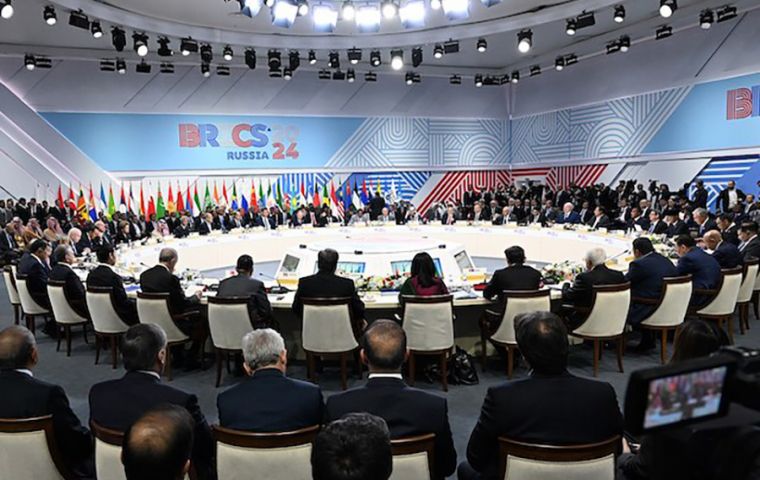MercoPress. South Atlantic News Agency
BRICS scientists want climate network created
 There is a significant scientific gap between BRICS member countries, the forum found
There is a significant scientific gap between BRICS member countries, the forum found A forum of Academies of Science of the BRICS bloc in Rio de Janeiro issued a declaration this week proposing the creation of a network of member countries to implement climate solutions, focusing on energy transition technologies and the development of joint artificial intelligence programs.
These initiatives are among the key topics outlined in the document highlighting the group’s “extraordinary potential” to establish a new “multipolar” world order, particularly following the expansion of its membership and partnerships.
BRICS now includes Brazil, Russia, India, China, and South Africa—the original members that gave the bloc its name—as well as Saudi Arabia, Egypt, the United Arab Emirates, Ethiopia, Indonesia, and Iran. Associate members participating in joint discussions include Belarus, Bolivia, Kazakhstan, Cuba, Malaysia, Nigeria, Thailand, Uganda, and Uzbekistan.
“In today’s fragmented world—marked by trade barriers, geopolitical instability, and environmental degradation—strengthening solidarity among nations is essential to accelerating progress in health, human development, economic prosperity, social justice, cultural well-being, peace, and planetary resilience,” states the communiqué of the scientific academies.
Forum participants also proposed a scientific cooperation framework to foster long-term partnerships among universities, research institutions, and innovation networks within BRICS countries.
They warned of the need to “address the significant gap that currently exists in scientific and technological collaboration between BRICS member countries,” cautioning that failure to do so could mean missing a “historic opportunity.”
“Current levels of joint research publications and innovations reveal untapped potential. Without deliberate and coordinated efforts, we risk missing transformative opportunities—opportunities in which science—including the social sciences and humanities—and technology could address socio-economic disparities, reduce inequalities, and promote environmental sustainability,” the statement released Wednesday also read.
The BRICS Science Academies Forum is held annually. This time around, it was in Rio de Janeiro, which will also host the BRICS Summit on July 6 and 7. The gathering revolved around ways to strengthen scientific cooperation in the Global South.
“What we want is for governments, multilateral institutions, and civil society organizations to work together with the scientific community to ensure that knowledge, innovation, and cooperation become the pillars of a revitalized Global South,” said Helena Nader, president of the Brazilian Academy of Sciences. (Source: Agencia Brasil)




Top Comments
Disclaimer & comment rulesCommenting for this story is now closed.
If you have a Facebook account, become a fan and comment on our Facebook Page!